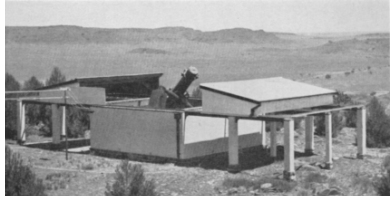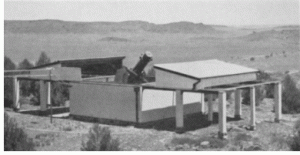ADH Baker – Schmidt Telescope
91 cm (36 inch) |

|
|
Index:
Summary; History; Current; Technical; Sources; Links; Gallery:
|
|
|
|
|
|
History:
- The name of the telescope, ADH, reflects the names of different observatories that sponsored the telescope. A stands for Armagh Observatory, the main observatory in Northern Ireland; D for Dunsink Observatory, outside Dublin in Eire; and H for Harvard.
- “Something must be said here about Armagh, in particular, because it comes very much into the story. Armagh Observatory – about thirty miles inland from Belfast – was founded in the late 18th century and during Victorian times an important star catalogue was compiled there by the then Director, a formidable gentleman named Romney Robinson. (Many stories are told about Dr Robinson. It is certainly true that on one occasion he managed to make the Government re-route a major railway line, on the grounds that the vibration of passing trains would prove an intolerable nuisance to the astronomers at Armagh.) Subsequently things became rather difficult and the Observatory’s revival came only in the 1930s with the arrival of Dr Eric Mervyn Lindsay, who had studied astrophysics under Shapley at Harvard. Lindsay had been assistant at Boyden before being called home to his native Ireland to take charge of the ailing Armagh Observatory where to be frank, very little research had been done for decades. Lindsay was nothing if not energetic. He revitalised the Observatory whose main instrument had been a modest 10-inch refractor; he installed an 18-inch Schmidt telescope, able to photograph wide areas of the sky… His Boyden work with the Magellanic Clouds had shown him the importance of southern stations, and Boyden was an ideal site for a new telescope of the kind needed for this sort of work. He joined forces with the Director of Dunsink Observatory, Professor Briick, and with Shapley, who was still at Harvard. Between them they raised sufficient funds for the construction of a new telescope, and in due course the ADH 36-inch was installed.” [Copied from Moore, pp. 124 – 125.]
- “The ADH 36-inch was installed. The optical system was of the Schmidt-Cassegrain pattern. The main drawback of a more conventional telescope is its small field of view; to photograph the entire sky with, says the famous Hale 200-inch at Palomar would take an impossibly long time. A new system had been developed in the 1930s by Bernhard Schmidt, an Estonian who had originally been concerned with the manufacture of explosives, but had blown off one of his arms, and had turned to optics as being rather safer. Basically, his idea was to use a spherical mirror rather than a paraboloid, and to correct the inevitable faults by means of a highly complex plate at the top end of the tube. The result is that wide areas can be photographed with good definition right to the edge of the plate, and Schmidt’s have proved invaluable – in fact, they provide so much information that only’ recently have instruments been developed for analysing the results with reasonable speed.” [Copied from Moore, p.125.]
Owners:
Consortium from Ireland and the USA:
- Armagh Observatory: North Ireland
- Dunsink Observatory: Republic of Ireland
- Harvard University: USA
Where Located: |
|
|
Present Location:
Boyden Observatory
.
Owner:
University of the Orange Free StateStatus:Condition: |
|
|
Type:Schmidt-Cassegrain type Reflector
Aperture: 36 inch (91.4 cm)
Focal Length: 119 inch (303 cm)
Mirror:Spherical
Mounting:
Attachments:
Manufacturer:
Operational History:
Building: |
|
|
Documentation:
.
Pictorial Sources:Bibliography:
- Moore, P. & Collins, P., Astronomy in Southern Africa, pp.124 -125. (General Source)
- Smits P. A Brief History of Astronomy in Southern Africa. (Unpublished).
|
|
|
Related Internal Links:
.
Related External Links:
SAO/NASA Astrophysics Data System (ADS)
Armagh Observatory |
Gallery

The Baker Schmidt Telescope. The boy in the picture is Derck Smits – the son of past ASSA President Peter Smits – here as a six year old. Derck became Proffessor of Astronomy at Unisa. Source: A.S.S.A. Archives: Peter Smits Collection.




